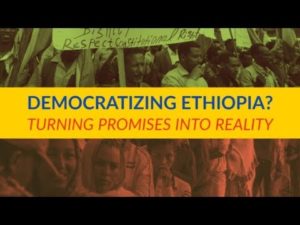“The committee has increasingly given awards to processes like in Ethiopia, rather than past achievements. The expectation is of course that the award nudges the process along,” said Henrik Urdal, director of the Peace Research Institute Oslo, which closely monitors the Nobel Peace Prize process. “I think the Abiy award was probably the riskiest of their process awards, though it would still be too early to call it a failure.”
— Democracy Digest (@demdigest) October 11, 2020
Barite Gudeta, a 26-year-old law student at Addis Ababa University who was caught up in the early Abiymania, is not convinced, The London Times reports.
“We are seeing what we knew before — extrajudicial killings and unlawful detentions,” she told The Times, dismissing the leader’s gender-balanced cabinet and pledge to plant millions of trees “as pointless PR stunts”.
Awol Allo, who nominated the prime minister for his Nobel prize, said his recent actions laid bare his “shallow, showman politics and a problematic notion of national unity” at odds with the complexities of accommodating more than 80 ethno-linguistic groups.

Rep. Karen Bass
Congressmember Karen Bass (right – D-CA), Chair of the House Foreign Affairs Subcommittee on Africa, a board member of the National Endowment for Democracy (NED), introduced a resolution encouraging respect for human rights and encouraging continued democratic progress in Ethiopia. Congressmember Bass was joined by Congressman Chris Smith, who serves as Ranking Member of the House Foreign Affairs Subcommittee on Africa.
“Prime Minister Abiy Ahmed spearheaded significant and commendable reform measures following his selection in April 2018, including releasing thousands of political prisoners, inviting exiled political opposition back to Ethiopia, negotiating a peace agreement with Eritrea, lifting bans on over 200 websites and improving media freedom,” the resolution states.
The government is indeed having to strike a difficult balance and faces criticism no matter what it does, says one government official: When it opens up the political space and tolerates the extreme views and actions of the opposition, it is attacked for not maintaining law and order. When it arrests those people involved in criminal and terrorist acts, it is accused of stifling dissent and opposition. According to a recent survey by Afrobarometer, a majority of Ethiopians trust in the prime minister’s vision and leadership.

 This week Ethiopia’s government entered the controversial sixth year of its five-year mandate. But the administration of Abiy Ahmed isn’t going anywhere… not even after a particularly violent summer, notes Ian Bremmer, president of Eurasia Group, a political-risk consultancy, and GZERO Media. Covid-19 has produced plenty of political drama these last few months, but Ethiopia has experienced more than most—here’s why,
This week Ethiopia’s government entered the controversial sixth year of its five-year mandate. But the administration of Abiy Ahmed isn’t going anywhere… not even after a particularly violent summer, notes Ian Bremmer, president of Eurasia Group, a political-risk consultancy, and GZERO Media. Covid-19 has produced plenty of political drama these last few months, but Ethiopia has experienced more than most—here’s why,  The country is in risk of
The country is in risk of 





